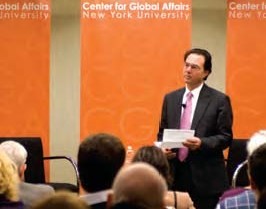
Michael Oppenheimer of NYU – Image Credit: NYU
In May I was invited to be an observer at the Scenarios Initiative of the Center for Global Affairs (CGA) at NYU. The focus of the session I attended was Turkey’s possible futures over the next decade. It is a fascinating and useful process, described on its website in the following way:
Basically, this initiative gets a group of very smart people (the group assembled for Turkey was extraordinary, see listing here) in a room for a day and a half to come up with three scenarios that are plausible and offer directions that are distinct from the other. The process forces people who are leading authorities in their fields to ponder other possibilities. In other words, every expert involved probably has a scenario they think most is likely to happen. However, they are still required to think through the other possibilities and what drivers might send things in a direction they had not considered (or at least not considered as seriously as other possible outcomes). This isn’t just an interesting intellectual exercise – it brings to the fore possibilities and variables that might not be as evident as they should be. Foreign policy experts can succumb to group think as much as any group, particularly in the policy hothouse inside the D.C. Beltway. The CGA scenarios report on Iran gives an excellent justification of forcing experts off the dependency of the beaten path:
The scenarios event is ably led by Michael Oppenheimer and his team of students. They make sure that grandstanding is kept to a minimum and that the focus remains on building a persuasive case for each scenario, identifying key drivers of change and which factors precipitate and propel each scenario. Prof. Oppenheimer guides the assembled team and urges them to consider both domestic and regional factors and what sorts of wild card events might add momentum to the various scenarios. This requires a suspension of disbelief that, in my opinion, is absolutely crucial if these scenarios are to add something new to the collective thinking and accepted wisdom. Imagine, for example, what scenarios might have been considered for Europe in the early 1980s if no one pondered the possible fall of the Berlin Wall (almost everyone missed that call). What wild card variable would have been able to predict the Iranian Revolution? Or 9-11? The line between plausible and possible is a thin one and foreign policy experts often return to the comfort of the probable. Michael Oppenheimer and his team gently nudge them out of that comfort zone and the results are well worth reading. I have participated in similar kinds of exercises at the Marine Corps War College and conferences at Ditchley Park in the UK. Both were extremely interesting and informative. But the CGA Scenarios Initiative’s focus on devising three specific, distinct and detailed scenarios adds a useful twist.
The initiative has already tackled China, Iraq and Iran (reports available here) and will address Ukraine later this year. More details on the Turkey scenario are available here and here. I recommend that you take a look and see what the future might hold.